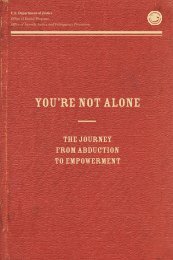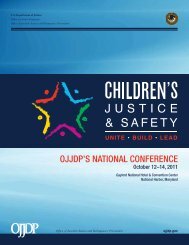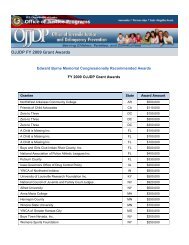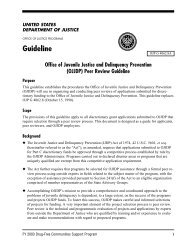OJJDP Family Listening Sessions: Executive Summary - Office of ...
OJJDP Family Listening Sessions: Executive Summary - Office of ...
OJJDP Family Listening Sessions: Executive Summary - Office of ...
You also want an ePaper? Increase the reach of your titles
YUMPU automatically turns print PDFs into web optimized ePapers that Google loves.
labeled. They reported that race <strong>of</strong>ten played a role in mislabeling a youth. <strong>Family</strong> members<br />
thought that the system should focus more attention and resources on youth receiving appropriate<br />
education while in the juvenile justice and other systems. Participants also voiced the concern<br />
that too <strong>of</strong>ten, their family did not meet the income or other requirements to qualify for services<br />
or receive the treatment needed.<br />
Key Comments/Highlights<br />
• My son was able to obtain his GED while incarcerated. However, this was due mostly to his<br />
persistence in getting the facility to provide him with the resources to get his GED. No one<br />
was really advocating for him behind the walls to get his education or counseling him on the<br />
importance <strong>of</strong> education.<br />
• In eighth grade, my son received counseling that worked really well for him. Years later,<br />
while locked in a detention facility, my son recognized he needed therapy and requested it.<br />
He was told that they could provide him with counseling once a month. We all understand<br />
that for therapy to be effective, it needs to occur more than once per month. I believe if my<br />
son were given the proper counseling when he asked for it, he would not be struggling with<br />
some <strong>of</strong> the issues he has today.<br />
• My son didn’t feel challenged, and the teachers weren’t taking any steps to provide him with<br />
further challenges. When he started to get in trouble at school, I had him evaluated. We<br />
learned that he was impulsive, and while he was able to do the schoolwork, he was not able<br />
to control his impulsive behaviors. Our education system needs to be better prepared to work<br />
with kids like my son and not automatically label them as troublemakers.<br />
• The system was so quick to label him and others like him as “bad” kids. The schools are too<br />
quick to jump to inconclusive assumptions, and they are sent to behavioral schools. Through<br />
my research, I’ve seen that behavioral schools are proven not to work. In fact, it appears<br />
they set them up for criminal behavior. And, you’ll likely see mostly African American and<br />
Hispanic children in behavioral schools.<br />
Question 5—Educational Goals<br />
Can you share one example <strong>of</strong> something that happened or that someone did while your<br />
child was in the juvenile justice system that helped in terms <strong>of</strong> achieving educational goals<br />
<strong>Family</strong> members placed a lot <strong>of</strong> value on fostering strong parent-child relationships while their<br />
children were involved with the juvenile justice system. <strong>Family</strong> engagement was the number-one<br />
factor in making sure youth got the education services they needed and in helping youth break<br />
negative cycles. <strong>Family</strong> members talked about the need to actively support and encourage family<br />
engagement, including engagement <strong>of</strong> stepparents and other family members, to eliminate<br />
barriers to family/parent advocacy for youth in the system, and to encourage family engagement<br />
throughout a young person’s involvement with the juvenile justice system. <strong>Family</strong> members also<br />
11



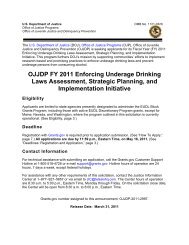
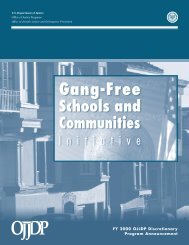
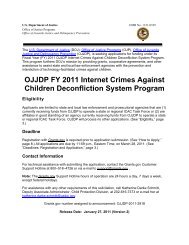
![Chapter 5 [PDF] - Office of Juvenile Justice and Delinquency ...](https://img.yumpu.com/46584340/1/190x245/chapter-5-pdf-office-of-juvenile-justice-and-delinquency-.jpg?quality=85)

